Changing attitudes during the pandemic
Research from the BMBF haben im Rahmen des vom BMBF-funded Viral Communication project reveals changing attitudes as the German public responds to the ongoing COVID-19 pandemic. Using survey research conducted across Germany at three time points during the pandemic (November/December 2020; March 2021; August/September 2021; N = 388) N = 388), results show:
- People are less concerned about their own health when it comes to COVID-19 in August/September 2021 (54%), compared to March 2021 (63%).
- Currently, people in Germany are generally concerned about a fourth wave in the autumn (83%) and the risks of future virus variants or mutations (68%).
- Results show increasing vaccination willingness over time among the sceptics and the undecided, a potential spark of hope for reaching herd immunity before winter. More than 90% of the respondents in the paired sample who were not explicitly ready to take the vaccine initially (late 2020) have now decided to get vaccinated.
- Most vaccinated people in Germany have acquired digital proof of vaccination (84%).
- Approval ratings for mandatory vaccination have remained stable at around 60% compared to March 2021.
- Public trust in governmental and scientific representatives and organisations has tended to decrease over time. For example, trust in health minister Jens Spahn has shifted to distrust between March 2021 (41% trust) and August/September 2021 (43% distrust).
1. Perceived COVID-19 risk
Compared to March 2021, people are now less concerned about their own health when it comes to COVID-19 (63%, n = 240 vs. 54%, n = 208). Possibly due to increased vaccination rates, people’s concerns have shifted away from their own health and towards the potential prolonging of the pandemic control measures, including another lockdown. In particular, after multiple COVID-19 waves of infections and regulations to avoid the worst public health outcomes, a strong majority of respondents (83%, n = 317) in August/September 2021 are concerned about a potential 4th wave this autumn. However, considerably fewer people (68%, n = 261) worried that virus variants will worsen the pandemic situation in Germany. About a quarter of respondents in August/September 2021 feel that the media is exaggerating the threat posed by the delta variant of the coronavirus (24%, n = 88), while almost one third (31%, n = 114)) are undecided on this topic.
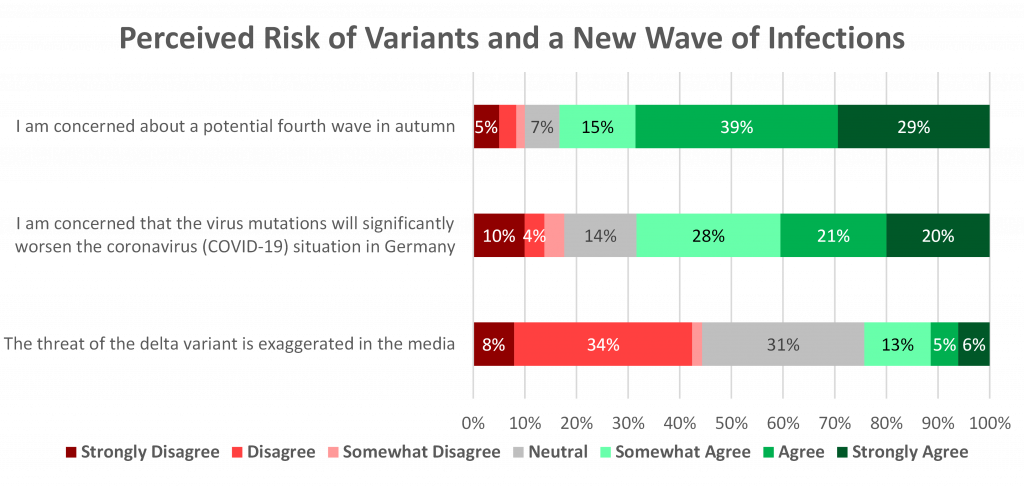 Figure 1. Risk perceptions related to virus variants as of August/September 2021.n (top to bottom): 381, 381, 363
Figure 1. Risk perceptions related to virus variants as of August/September 2021.n (top to bottom): 381, 381, 363
2. Vaccination willingness
The decrease in perceived risk of health complications related to COVID-19 may be due to increased vaccination rates in Germany. A major proportion of our weighted paired sample have already received at least one dose of the COVID-19 vaccine (92%, n = 307), and around 8% (n = 25) are not yet vaccinated. Not only have most of those who had earlier said they were willing to be vaccinated gotten the vaccine, but also vaccination willingness steadily increased over time. Of the respondents who were not explicitly willing to vaccinate against COVID-19 in late 2020, 47% changed their mind by March 2021. Of those who were still not explicitly willing to vaccinate in March 2021, 79% (n = 52) changed their mind in the meantime. Within this study’s time frame, these results show an overall accelerating vaccination willingness rate among the sceptics and the undecided – a potential spark of hope for reaching herd immunity before winter.
However, deeds do not always follow words: As of August/September 2021, 3% (n = 7) of those who indicated willingness to get vaccinated in March 2021 did not actually vaccinate. Interestingly, 44% (n = 11) of those who are still unvaccinated against COVID-19 as of August/September 2021 indicated that they would be willing to get vaccinated. We found that most of these respondents are between 20 and 39 years of age.
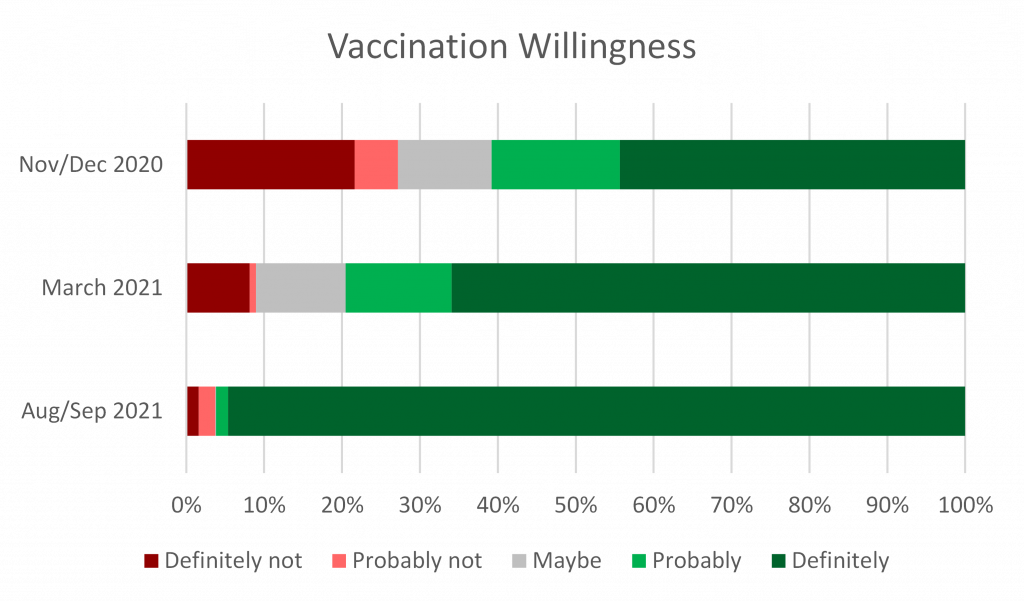 Figure 2. Vaccination willingness over three measurement points. Respondents who indicated to have been vaccinated were included within the definitely category. n (top to bottom): 380, 385, 424.
Figure 2. Vaccination willingness over three measurement points. Respondents who indicated to have been vaccinated were included within the definitely category. n (top to bottom): 380, 385, 424.
On the other side of the vaccination willingness spectrum, there is a minority that consistently refuses to vaccinate against COVID-19. Results from interviews conducted in parallel with the survey give us an idea of their rationale. Our interviews conducted in September 2021 show that some people base their decision to not get vaccinated on their perceived risk. They believe exposure to potentially adverse (long-term) side effects of the vaccine outweighs the risk of getting severely sick from COVID-19:
I don’t see myself as being at risk, and because of that I won’t get vaccinated. […] I do not see the point of being vaccinated with a vaccine that has an emergency approval, for which no well-founded clinical studies are available […] (male, 30-44 years)
Additionally, a sense of conspiracy around the topic of vaccination and distrust towards any promotion of vaccination can contribute to vaccination hesitancy.
I have actually become even more sceptical after all that has happened in other countries where vaccination was widely used. These countries in particular suddenly have a high number of people with the disease. (male, 45-59 years)
Accompanying the trust issues for these individuals is a sense of injustice towards those who resist measures to mitigate the spread of COVID-19, which can further reinforce vaccine hesitancy.
And what if people here don’t get vaccinated? Will the unvaccinated then suddenly be put under house arrest for the end of their time […]?[…]. I have lost all confidence that anything here is still done according to the rule of law. […] What is going on here, what is happening right now, is disenfranchisement of the unvaccinated. That is a thing worthy of any dictatorship. (male, 45-59 years)
2.1 Digital vaccination proof
The aforementioned sense of injustice has recently been fueled by the application of so-called 2G or 3G rules across Germany, enforcing mandates for certain activities. Due to these mandates, digital proof of vaccination has become quite relevant. Of those who have already gotten vaccinated, 84% (n = 262) acquired digital proof. In turn, 87% (n = 222) of respondents who got the digital proof transferred it onto a mobile device, indicating overall high acceptance of the digital vaccination proof in Germany.
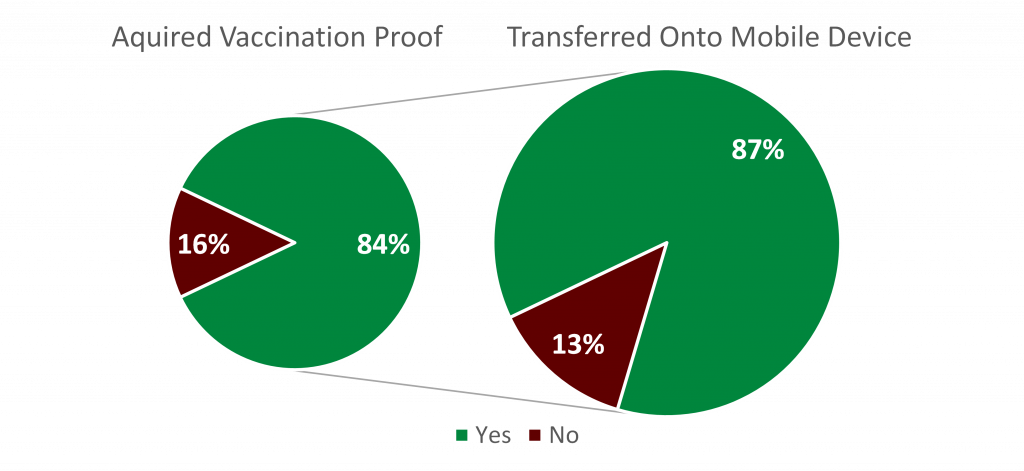 Figure 3. Acquisition and use of digital COVID-19 vaccination proof as of August/September 2021. n (left to right): 313, 257
Figure 3. Acquisition and use of digital COVID-19 vaccination proof as of August/September 2021. n (left to right): 313, 257
Looking at the group of people who have not acquired the digital proof, we found from a preliminary analysis of open-ended responses that many have not yet had time to acquire it. A second apparent reason was technical or logistical issues from the supply-side (i.e., the state or pharmacies). The main reason for not transferring the acquired proof onto a mobile device is that respondents do not own such a device in the first place. These respondents are all above the age of 50.
2.2 Mandatory vaccination
Although an absolute obligation to vaccinate against COVID-19 has repeatedly been rejected, a large proportion of the German public has been in favour of introducing mandatory vaccination. In fact, between late 2020 and March 2021, respondents’ support for mandatory vaccination increased from 46% (n = 170) to 60% (n = 225). This number has remained stable throughout the summer.
The respondents were also asked about their level of support for vaccination mandates in different contexts in August/September 2021. When it comes to travelling, mandates for travels by ferry (80%, n = 287) or plane (80%, n = 292) are supported more strongly than local travels by public transportation (58%, n = 199). In general, the strongest mandate support is expressed for ‘large indoor in-person events’ (82%, n = 304), while mandates for large outdoor (75%, n = 278) and ‘small indoor in-person events’ (65%, n = 238) are supported slightly less. Respondents are particularly against mandates for ‘visiting public parks’ (16% support, n = 60) and ‘visiting zoos’ (29% support, n = 104). Overall, mandates for indoor leisure activities such as ‘eating at a restaurant’ or ‘watching a film at the cinema’ are supported: More than 50% of the respondents thought vaccination proof should be requested frequently, usually, or always.
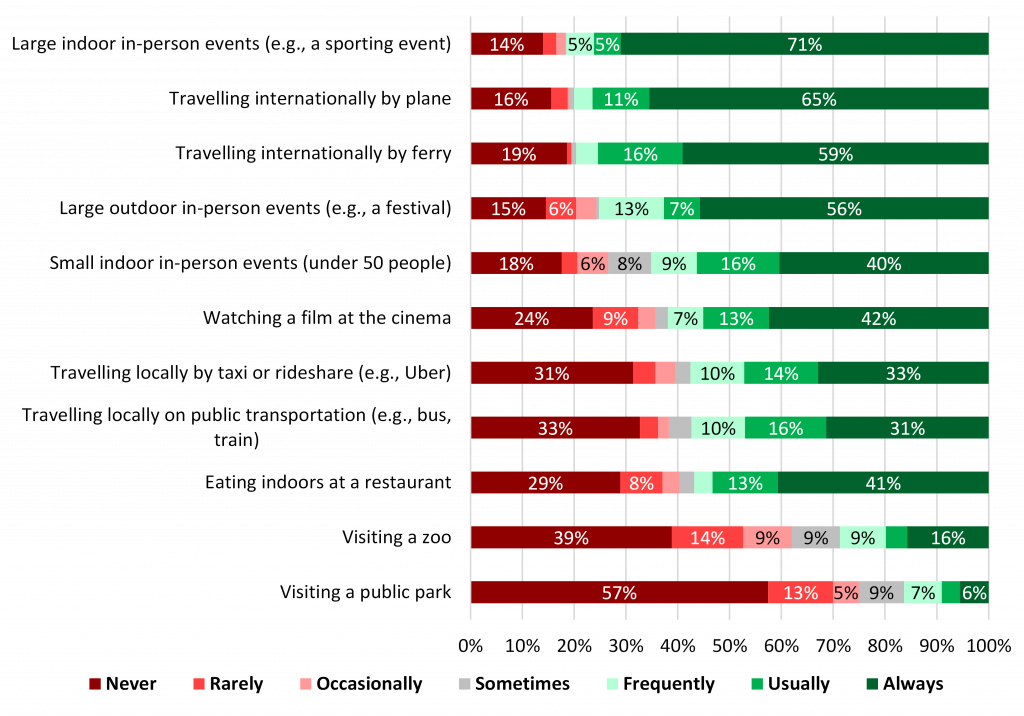 Figure 4. Support for situational COVID-19 vaccine mandates as of August/September 2021. n (top to bottom): 373, 365, 360, 369, 365, 365, 350, 347, 370, 364, 369
Figure 4. Support for situational COVID-19 vaccine mandates as of August/September 2021. n (top to bottom): 373, 365, 360, 369, 365, 365, 350, 347, 370, 364, 369
3. Trust
Vaccination willingness is partially dependent on trust in the relevant entities promoting vaccination. Overall, people’s trust in their primary news source, Christian Drosten, and the Robert-Koch Institute (RKI) have remained the highest since the end of 2020 (as of August/September 2021: 81%, 71%, and 70%, respectively). Angela Merkel is the only highly trusted political representative (71% as of August/September 2021), and her trust score is the only one that increased since March 2021, although only ever so slightly (+1%). All other trust scores steadily decreased; particularly health minister Jens Spahn saw a massive loss of trust which even shifted to distrust between March 2021 and August/September 2021. He is now the only one among the actors included in our survey whom the German public tends to distrust.
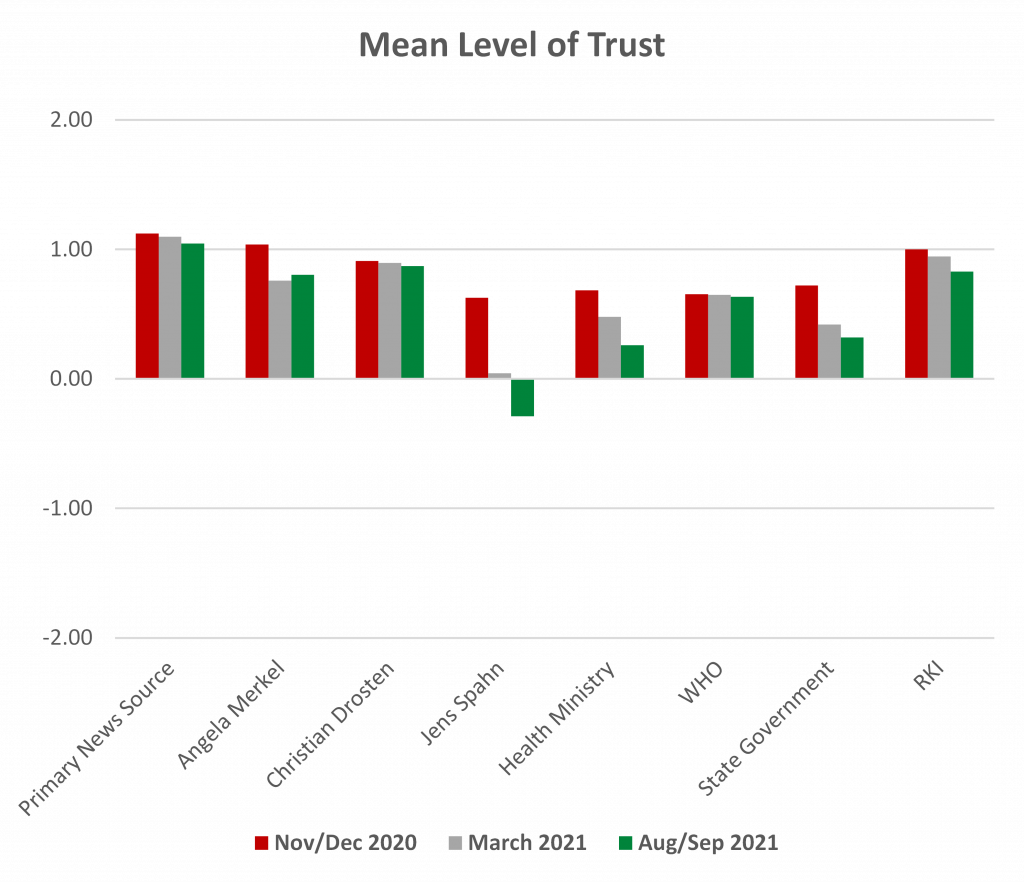 Figure 5. Development of trust in various scientific and governmental actors over three measurement points. Negative values indicate distrust, while positive values indicate trust. n (left to right): 303, 283, 278, 297, 279, 274, 293, 291, 287, 242, 166, 145, 263, 209, 218, 262, 232, 245, 252, 217, 202, 320, 308, 310
Figure 5. Development of trust in various scientific and governmental actors over three measurement points. Negative values indicate distrust, while positive values indicate trust. n (left to right): 303, 283, 278, 297, 279, 274, 293, 291, 287, 242, 166, 145, 263, 209, 218, 262, 232, 245, 252, 217, 202, 320, 308, 310
With the steadily increasing vaccination rate, there is hope that Germany could reach the goal of herd immunity in the near future. However, vaccination efforts which are tailored to young people could be important contributions to ensure Germany reaches herd immunity. As the majority of people in Germany are now vaccinated and have acquired digital proof of vaccination, vaccine mandates for activities and events with higher risk of infection are receiving widespread public acceptance. While the physical proof of vaccination is just as valid as the digital copy, activities that require people to use mobile devices (e.g., for scanning QR-codes to check in to an event or place) could not be as accessible for particularly members of older generations who do not own or cannot operate mobile devices.
About the Study
As part of the Viral Communication project, three national surveys were conducted in Germany from 31 October to 14 December 2020, 2 March 2021 to 22 March 2021, and 01 August 2021 to 20 September 2021, respectively. The primary survey employed stratified random postal sampling so as to accurately represent the German population aged 16 and above (N = 1,063). Respondents were able to opt in to participate in future surveys. The total number of respondents who participated in all three surveys and met the inclusion criteria for analysis was N = 388. The cases were weighted according to key socio-demographic distributions as of the last German census. The percentages presented in this report are subject to a maximum margin of error of ±5% at a 95% confidence level.